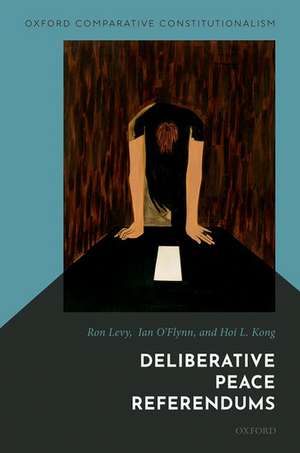Deliberative Peace Referendums: Oxford Comparative Constitutionalism
Autor Ron Levy, Ian O'Flynn, Hoi L. Kongen Limba Engleză Hardback – 25 mar 2021
Preț: 613.08 lei
Preț vechi: 824.70 lei
-26% Nou
Puncte Express: 920
Preț estimativ în valută:
117.33€ • 127.40$ • 98.55£
117.33€ • 127.40$ • 98.55£
Carte disponibilă
Livrare economică 21-27 martie
Preluare comenzi: 021 569.72.76
Specificații
ISBN-13: 9780198867036
ISBN-10: 0198867034
Pagini: 256
Dimensiuni: 163 x 240 x 20 mm
Greutate: 0.52 kg
Editura: OUP OXFORD
Colecția OUP Oxford
Seria Oxford Comparative Constitutionalism
Locul publicării:Oxford, United Kingdom
ISBN-10: 0198867034
Pagini: 256
Dimensiuni: 163 x 240 x 20 mm
Greutate: 0.52 kg
Editura: OUP OXFORD
Colecția OUP Oxford
Seria Oxford Comparative Constitutionalism
Locul publicării:Oxford, United Kingdom
Recenzii
Ambitious, precisely argued, comprehensive, and important, Levy, O'Flynn and Kong combine hard-headed realism about the difficulties of deliberating across long-standing and deep divisions in post-conflict contexts (including indigenous-settler relations), with the equally realistic view that the alternatives to deliberative democracy are almost always worse. Their suggestions for 'Deliberative Peace Referendums' provide politically attractive and practical means for generating inclusion, stability, and political legitimacy in post-conflict political transitions. A must-read for deliberative democrats focused on constitution-making as well as for practitioners focused on post-conflict political transitions.
This impressive book boldly takes deliberative democracy into territory in which it has usually not dared to go. The authors make a strong and nuanced case for the deliberative peace referendum in conflict societies. If properly designed, it has the potential to help produce constitutional settlements that are enduring even in conflict societies racked with controversy about group sovereignty, succession and indigenous settler rights. In the process of presenting their case, the authors make significant contributions to the theory and practice of deliberative democracy, referendums, and peace processes generally.
This ground-breaking study shows how deliberative peace referendums (DPRs) can help find common ground in peace processes - contexts where democratic deliberation is urgently needed and yet hard to succeed. The authors convincingly argue that DPRs can avoid problems of 'ordinary' peace referendums and thus help achieve more sustainable peace settlements.
This impressive book boldly takes deliberative democracy into territory in which it has usually not dared to go. The authors make a strong and nuanced case for the deliberative peace referendum in conflict societies. If properly designed, it has the potential to help produce constitutional settlements that are enduring even in conflict societies racked with controversy about group sovereignty, succession and indigenous settler rights. In the process of presenting their case, the authors make significant contributions to the theory and practice of deliberative democracy, referendums, and peace processes generally.
This ground-breaking study shows how deliberative peace referendums (DPRs) can help find common ground in peace processes - contexts where democratic deliberation is urgently needed and yet hard to succeed. The authors convincingly argue that DPRs can avoid problems of 'ordinary' peace referendums and thus help achieve more sustainable peace settlements.














